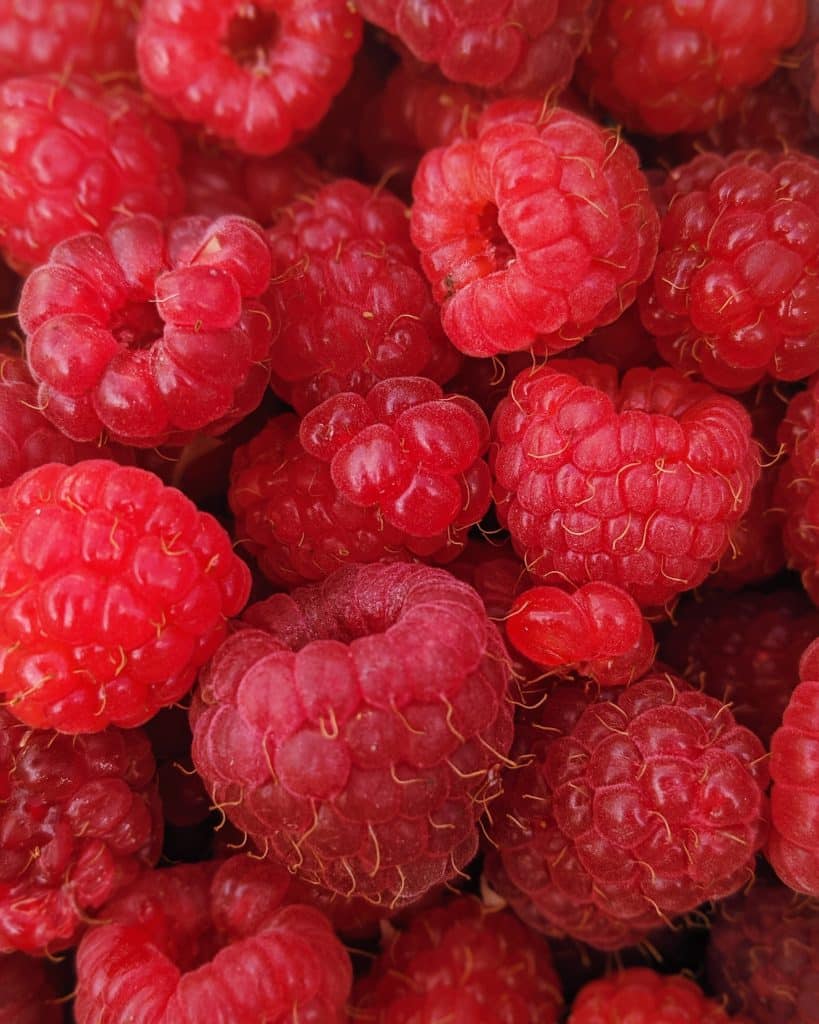Raspberries are tasty and nutritious and you can see a lot of them during the summer. As a dog parent you may be wondering if dogs can eat raspberries too? Yes, they can! You can offer it as a treat or reward. This fruit is packed with vitamins and minerals your dog needs.
However, if you want to offer raspberries to your buddy, it’s best to check out the risk it may have for them. Although it’s good for their immune system, raspberries may not be suitable for dogs to eat regularly. Keep on reading to learn more if raspberries are good or bad for your canine.
What Are the Health Benefits of Raspberries to Dogs?

It may look small in size but raspberries contain important nutrients for dogs. This fruit has antioxidants to keep canines healthy. But no matter how good raspberries may seem, too much of it can also be bad for your beloved pet. So it’s important to feed your dog a balanced diet and give fruits as a treat.
1. Packed with Antioxidants
Raspberries contain antioxidants which can boost your dog’s immune system. Based on studies, raspberries have more antioxidants compared to other fruits. It has ellagic acid, vitamin C, quercetin, and flavonoids.
Antioxidants are important especially for senior dogs. It will reduce inflammation and can even slow the development of arthritis. This can also protect dogs from cognitive aging and even dementia.
2. Contains Dietary Fiber
Dietary fiber is important for your canine’s digestive system. The insoluble fiber in raspberries can’t break down. Since this will be intact, it can pull the other waste from the digestive tract. Eating raspberries can avoid constipation as well as diarrhea.
3. Has Vitamin K
Vitamin K is a fat soluble vitamin which has the protein prothrombin. This vitamin is essential for bone metabolism and blood clotting. It can also regulate your dog’s blood calcium levels and prevent heart disease.
4. Includes B-Complex
B-complex is also important for your canine’s health since it helps to regulate their nervous system and metabolism. It can also keep their coat healthy and maintain heart function. Dogs need these vitamins to stay in top shape.
5. Trace Minerals are Present
Raspberries contain trace minerals such as potassium, copper, magnesium, iron, and manganese. It supports canine’s muscle contraction, nervous system, cell function, fluid balance,and skeletal structure.
How to Prepare Raspberries for Dogs
Now that you know that raspberries are good for dogs, it’s time to learn how to prepare them. Offer small amounts of raspberries and see if they will like it. Even if it tastes good to you, it may not be the same case with your pooch. Here are some ideas on how to prepare raspberries for dogs.
Give your dog some fresh or frozen raspberries as a treat. It will help them to feel refreshed during a hot day. Raspberries are small and soft enough for dogs to eat. It’s also a great way to give your canine a treat.
Raspberries will make a great shake or smoothie. Blend it with other berries and yogurt. Freeze it to make a dog treat that will keep them cool especially during the hot summer months.
Try adding some raspberries to your pet’s dinner bowl. It’s the best way to get more antioxidants and other nutrients in one bowl. Only give raspberries to your dog occasionally and don’t overdo it.
Avoid giving canned raspberries to your dog since it contains fats, added sugar, and artificial flavors. Doing this can give them an upset stomach. Make a berry salad with a mix of different berries as a treat.
Why Raspberries May Be Bad for Dogs

Raspberries seem to be harmless for dogs and it’s also good for them. The antioxidants in raspberries will straighten the canine’s immune system. But can raspberries be bad for dogs?
1. Contain Xylitol
Xylitol is a type of sugar substitute that can be found from gums, peanut butter, and more. Although it’s fine for humans, it’s toxic for canines. Raspberries have natural xylitol content. Although, your dog will be safe as long as you don’t feed it 32 cups which is the fatal dose – and also way more than any dog can eat.
In case your dog ate a lot of raspberries, don’t panic. They will need to eat a very huge amount before it will have a bad effect. In some cases, the dog might experience vomiting, diarrhea, or an upset stomach.its best to consult a vet if it gets worse.
2. High Fiber Content
Although dogs also need to have fiber too, it should be fine to feed it to your dog. It can help out with constipation and diarrhea. However, you can’t always give raspberries to your dog. Try to only make it a reward instead of feeding it to your dog everyday.
3. Sugar
Fruits contain high sugar content except raspberries. Consuming a huge amount of sugar is not good for your dog. The best thing to do is to give raspberries as a treat. Don’t offer it as a replacement for your dog’s regular diet. They need more food variety to get all the canine nutrition they need.
The canine’s digestive system can’t process sugar in huge amounts. Raspberries are sweeter these days than before. It will be hard for their digestion since wild berries are a lot sweeter in modern times. Offer your dog a few pieces of raspberry to avoid health issues.
So Can Dogs Eat Raspberries?
Yes, dogs can eat raspberries as long as you give them a small amount. It should also be given to your dog occasionally. If you want to make sure that it will not be a choking hazard, you can smash the raspberries instead of feeding it whole.
However, puppies and small dogs are more prone to having a sugar reaction. Just give your dog a controlled amount to avoid digestive issues. Dogs may also have stomach discomfort, gas, and even diarrhea. Feeding raspberries to dogs as an occasional treat will avoid these health problems.
Image Credits
Unsplash – Raspberries
Unsplash – Golden Retriever Puppy



